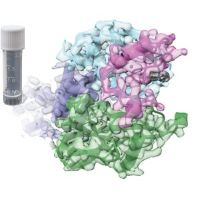Specification
| Description | Recombinant protein from the full-length sequence of homo sapiens FK506 binding protein 6 (FKBP6), transcript variant 1 (NM_003602). |
| Organism | Homo sapiens (Human) |
| Expression Host | Human Cells |
| Tag Info | His or DYKDDDDK. Please contact us if you need further information or require specific designed tag. |
| Purity | Greater than 90% by SDS-PAGE gel |
| Uniprot ID | O75344 |
| Entry Name | FKBP6_HUMAN |
| Gene Names | FKBP6 FKBP36 |
| Alternative Gene Names | FKBP36 |
| Alternative Protein Names | Inactive peptidyl-prolyl cis-trans isomerase FKBP6 (Inactive PPIase FKBP6) (36 kDa FK506-binding protein) (36 kDa FKBP) (FKBP-36) (FK506-binding protein 6) (FKBP-6) (Immunophilin FKBP36) |
| Application | Antigens, Western, ELISA and other in vitro binding or in vivo functional assays, and protein-protein interaction studies; For research & development use only! |
| Buffer | Purified protein formulated in a sterile solution of PBS buffer, pH7.2, without any preservatives |
| Endotoxin | Endotoxin level is < 0.1 ng/µg of protein (<1EU /µg) |
| Length | 327 |
| Molecular Weight(Da) | 37214 |
| Protein Sequence | (The sequence of expressed protein may have some variation from the sequence shown below. Please contact us for the exact sequence.) MGGSALNQGVLEGDDAPGQSLYERLSQRMLDISGDRGVLKDVIREGAGDLVAPDASVLVKYSGYLEHMDRPFDSNYFRKTPRLMKLGEDITLWGMELGLLSMRRGELARFLFKPNYAYGTLGCPPLIPPNTTVLFEIELLDFLDCAESDKFCALSAEQQDQFPLQKVLKVAATEREFGNYLFRQNRFYDAKVRYKRALLLLRRRSAPPEEQHLVEAAKLPVLLNLSFTYLKLDRPTIALCYGEQALIIDQKNAKALFRCGQACLLLTEYQKARDFLVRAQKEQPFNHDINNELKKLASCYRDYVDKEKEMWHRMFAPCGDGSTAGES |
Background
| Function | FUNCTION: Co-chaperone required during spermatogenesis to repress transposable elements and prevent their mobilization, which is essential for the germline integrity. Acts via the piRNA metabolic process, which mediates the repression of transposable elements during meiosis by forming complexes composed of piRNAs and Piwi proteins and govern the methylation and subsequent repression of transposons. Acts as a co-chaperone via its interaction with HSP90 and is required for the piRNA amplification process, the secondary piRNA biogenesis. May be required together with HSP90 in removal of 16 nucleotide ping-pong by-products from Piwi complexes, possibly facilitating turnover of Piwi complexes (By similarity). {ECO:0000250}. |
| Pathway | |
| Protein Families | FKBP6 family |
| Tissue Specificity | Detected in all tissues examined, with higher expression in testis, heart, skeletal muscle, liver, and kidney. |
QC Data
| Note | Please contact us for QC Data |
| Product Image (Reference Only) |  |

